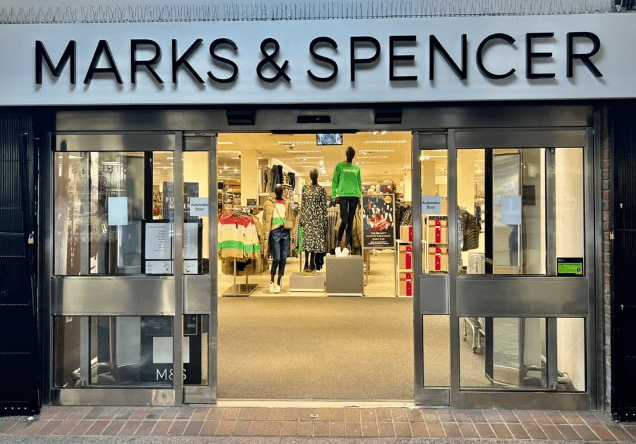Marks & Spencer is closing 11 of its in-store cafes as part of a dramatic £300 million revamp of its food business, aiming to refocus its retail offering and modernise its high street presence.
The closures, which impact a small portion under 4% of its 316 food outlets, are part of a broader plan to streamline operations and prioritise product space for more in-demand grocery items.
Marks & Spencer axes cafes to make way for food hall expansion
Despite the changes, M&S has confirmed that no jobs will be lost, with all staff affected by the closures being redeployed to other positions within the company.
“As we look to modernise our food business and offer the best of M&S Food to more people, more often, we’re investing in our store estate to give our customers the widest possible product range,” a spokesperson said on Monday.
From Flat Whites to Fresh Food Focus
M&S is shifting its strategy to cater to evolving customer preferences. In smaller food stores, the company is repurposing underutilised cafe areas to make room for more grocery lines. The aim? To give shoppers a wider selection of M&S food favourites in more locations.
“This includes opening brand-new coffee shops offering delicious food and barista-made fairtrade coffee, including at our brand-new Bristol Cabot Circus store.
In some of our small Food stores, where customers want a greater range of M&S Food, our transformation also involves repurposing cafe space across 11 small food stores, out of over 300 M&S cafes, coffee shops and coffee-to-go locations,” the spokesperson added.
This strategic pivot is part of the brand’s ambitious plan to grow its food store footprint to around 420 locations by the end of 2028, reinforcing M&S’s commitment to becoming a leading force in the grocery market.
Beneath the Surface: What This Means for M&S
While losing a cafe might disappoint loyal latte-lovers, M&S’s vision points to long-term gains. The £300m investment isn’t just about cost-cutting, it’s about reimagining the high street shopping experience.
Already, the retailer has:
- Converted several full-line stores into dedicated food halls
- Invested in upgrading existing food-only outlets
- Modernised layouts to increase capacity and product range
This transformation is designed to meet the demand for quicker, more efficient grocery shopping, especially in urban areas where space is limited and footfall is high.
Bouncing Back After a Cyber Blow
The cafe closures come at a time when M&S is also recovering from a major cyberattack in April, which forced the company to halt online orders for six weeks. The breach, disclosed on Easter Sunday, is expected to cost the company approximately £300 million.
While the full financial impact is still being absorbed, the retail giant is clearly pushing forward with its long-term growth strategy, undeterred by recent setbacks.
A New Chapter for a British Staple
M&S’s decision to close select cafes marks a pivotal point in its evolution, trading tables and teacups for aisles and avocados. The brand is betting big on food, focusing on high-quality convenience and expanding its reach across the UK.
For now, coffee lovers may need to look elsewhere in some locations, but shoppers can expect more variety, fresher layouts, and bigger food ranges as M&S doubles down on its core strengths.
This isn’t just a shake-up. It’s a reshaping of the future of British retail.






